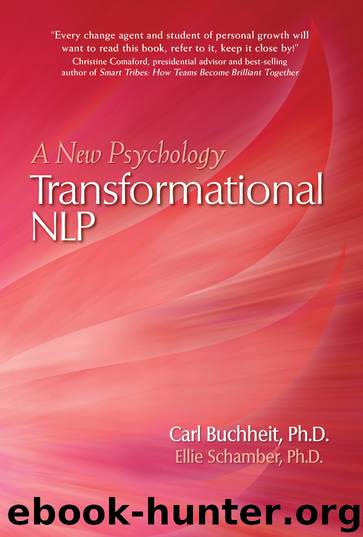Transformational NLP by Carl Buchheit Ellie Schamber

Author:Carl Buchheit,Ellie Schamber
Language: eng
Format: epub
ISBN: 9781940468648
Publisher: Lightning Source Inc.
Published: 2017-07-23T04:00:00+00:00
Hope for a Better Past
One of the most curious features of human beings is their unconscious but persistent hope that the past (or some parts of it) will have been different than it was. In NLP, it is common knowledge that when people who want to change pain-sustaining thought and behavior patterns have great difficulty changing, there may be an “ecology problem,” or concern about the possible unwanted consequences of otherwise good changes. In conventional NLP, the locus of attention for all ecology-related losses is concern about the future: What is it that we value that might be compromised or lost in the future as a consequence of new choices and changes that are made in the present? Very often the answers to this and related ecology concerns have to do with loss of relationship, loss of financial stability, loss of opportunity or freedom, and so on. This inquiry makes complete common sense, but my experience has taught me that something else is involved, something that limits present change even more than caution (both conscious and other-than-conscious) regarding possible future loss. That something else is the entirely out-of-consciousness concern about loss of hope for a better past. My experience is that whenever changes that are done properly and respectfully will not go in, or when they will not stick, this concern about past loss is a large part of the reason.
Maintaining hope for a better past is never a conscious endeavor. It makes no sense in reason. Instead, all hope for a better past is mediated through our emotions. Although the emotions themselves are detectable, the mechanisms that give rise to them are not noticeable in conscious awareness. Yet the feelings created by the mechanisms are strong enough to sadly contaminate our ability to make choices and follow through with these choices about important things in our lives.
One of the drivers for holding onto or otherwise avoiding the resolution of present pain, in order to prevent the loss of hope that things will have been better in the past, is what I call “Suffering Obligations of Love” (SOL). “Suffering” has a unique definition here: it can be described as “the terrible things we do to ourselves in an unworkable effort to say ‘I love you’ to someone else.”2 It seems that people tend to suffer for some part of the experience of their ancestors.* As far as we know, humans are the only creatures who use Suffering to communicate love, and the only creatures who compromise their present and future well-being in an effort to improve the experience of their forbears! This is an unconscious attempt to belong to the family and assuage our guilt at having escaped their fate. If our pain diminishes, we have the bad feeling that we are abandoning the ones we love (abandoning them in their present and our past!), so we unconsciously find ways to maintain our pain by arranging things so that our own lives will not improve until theirs do in their present (which of course is impossible, since it is our past!).
Download
This site does not store any files on its server. We only index and link to content provided by other sites. Please contact the content providers to delete copyright contents if any and email us, we'll remove relevant links or contents immediately.
Doing It: Let's Talk About Sex... by Hannah Witton(8550)
The 5 Love Languages: The Secret to Love That Lasts by Gary Chapman(8498)
Should I Stay or Should I Go? by Ramani Durvasula(6785)
The Road Less Traveled by M. Scott Peck(6635)
The Lost Art of Listening by Michael P. Nichols(6474)
Daring Greatly by Brene Brown(5642)
We Need to Talk by Celeste Headlee(4870)
Beartown by Fredrik Backman(4419)
Men In Love by Nancy Friday(4327)
The State of Affairs by Esther Perel(3931)
The Rules Do Not Apply by Ariel Levy(3906)
How To Win Friends and Influence People by Dale Carnegie(3772)
Reflections Of A Man by Mr. Amari Soul(3703)
The Ethical Slut by Janet W. Hardy(3504)
Algedonic by r.h. Sin(3502)
Pillow Thoughts by Courtney Peppernell(3397)
Finding My Forever by Heidi McLaughlin(3307)
He's Just Not That Into You by Greg Behrendt & Liz Tuccillo(3303)
I Love You But I Don't Trust You by Mira Kirshenbaum(3229)
